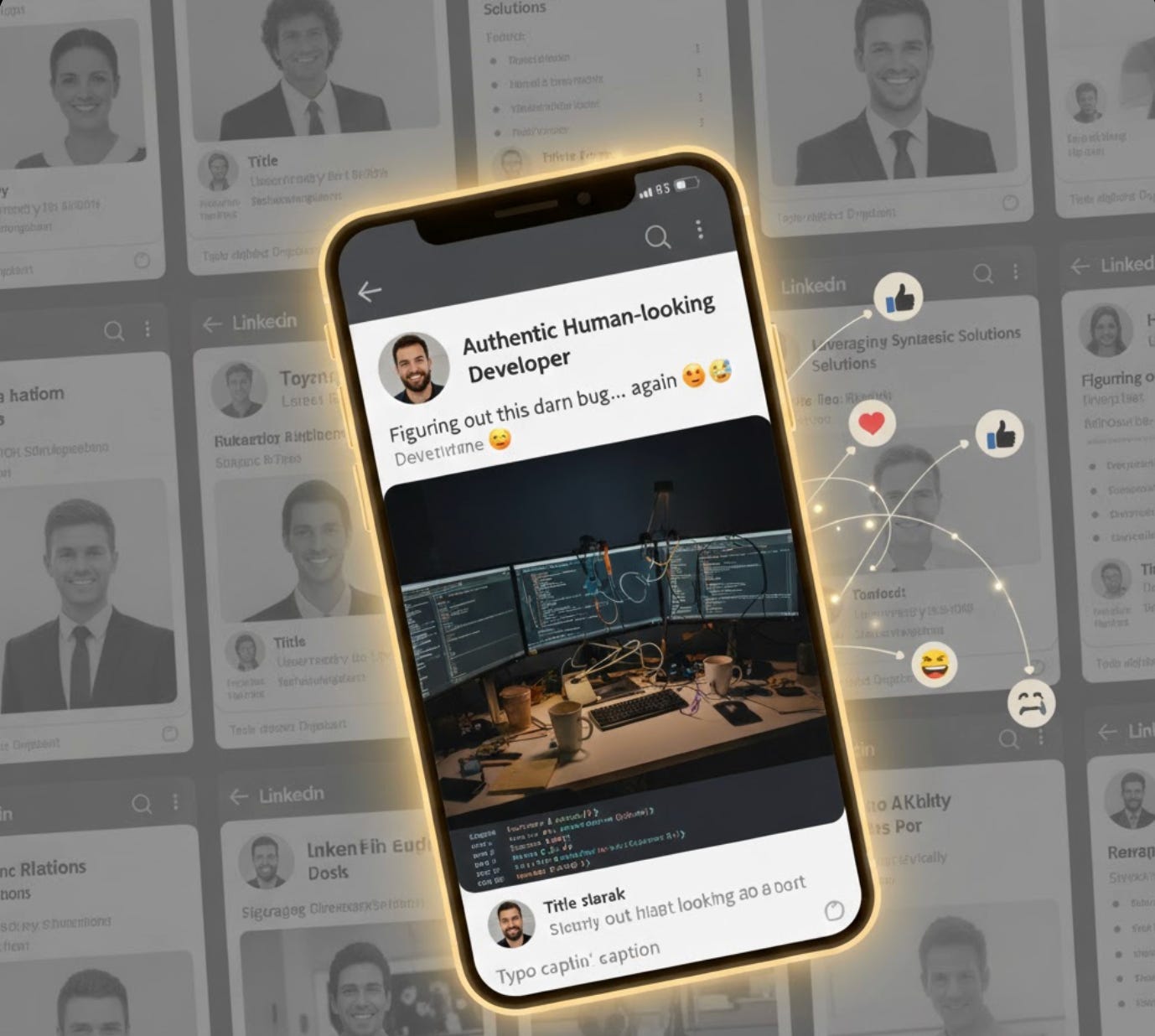Why AI makes this the best time to be YOU 🫵🏻 on LinkedIn
Your “imperfect” human voice is now your greatest advantage.
Let’s talk about why you probably hate LinkedIn.
If you’re like most developers I know, you’re probably insecure about posting. You look at your feed and see a ton of “fake” content.
It’s all “corporate-speak,” bragging disguised as humility (”humbled to announce...”), and now, a new monster: a flood of perfectly polished, completely soulless, AI-generated posts. 🤖
It feels impossible to compete. It makes you want to just give up and not participate.
I want to tell you something: this is the best news we’ve ever received.
The rise of AI-generated “noise” is the single greatest opportunity for real, authentic developers to stand out. Why?
Because in a world drowning in perfect, fake content, your authenticity has become the rarest and most valuable commodity of all.
Your insecurity about not sounding “professional” enough? That “imperfect” human voice you’re afraid to show? That is now your greatest strength.
The “perfect” profile is now suspicious 🧐
We’ve entered a new era. For years, we were all trying to be “perfect.” We checked for every typo, used fancy buzzwords, and tried to sound like a corporate press release.
That game is over.
Why? Because an AI can do that better than we can. A bot can generate a “flawless” post about “leveraging synergies” in 10 seconds.
The result? We’re all developing an “AI-dar.” Your network, your peers, and your future boss are getting really good at spotting content that has no human soul. They aren’t impressed by perfection anymore; they’re bored by it.
That “perfect,” flawless post you’re trying to write? It doesn’t look “professional” anymore. It looks suspicious. It looks lazy. It looks like you had nothing to say, so you asked a bot to say it for you.
Your “messy” human process is your greatest strength 🛠️
An AI is great at giving you a final, clean answer.
What it can’t do is show the messy, human process of getting there.
It can’t show the frustration of a 3-day bug. 😫
It can’t show the “aha!” moment at 2 AM when you finally figure it out.
It can’t show the real-world trade-offs you had to debate (”we could use a ‘quick and dirty’ solution now, or build it ‘right’ and take three weeks...”).
It can’t show the vulnerability of asking a “stupid” question in a code review that unblocks the whole project.
This is what you have that an AI doesn’t. This is your “proof of work.” This is the stuff that actually proves your seniority and your value as a teammate.
Think about the last time you had a long debate with your team about two different database technologies. An AI can list the pros and cons. It can’t tell the story of why your team chose one, the human trade-offs, and the (small ‘p’) political navigation it took. That is the story a senior developer wants to read.
When you share your process—your struggles, your learnings, your small wins—you are doing something an AI cannot. You are proving you are a real, thinking, problem-solving human.
Your goal on LinkedIn is no longer to look perfect. Your goal is to look real.
An AI doesn’t have your unique voice 🗣️
AI content is boring because it’s an average of everything that’s already been said. It has no personality.
You, on the other hand, have a unique voice.
You have a weird sense of humor.
You use down-to-earth language.
You have strong opinions about that new JavaScript framework.
You are a non-native English speaker, and you spend an hour trying to make your post sound “perfect”? Stop. That “perfect” English often sounds less authentic than your slightly “imperfect” but direct way of writing. Worrying about a typo or a slightly odd sentence is a waste of time. Your genuine thoughts are more trustworthy than a post polished by a grammar checker until it has no soul.
You make the occasional typo.
In the past, you might have tried to hide all this to sound more “professional.” Stop doing that.
That occasional typo isn’t a failure. It’s a “human watermark.” 💧
That down-to-earth language isn’t “unprofessional.” It’s authentic. It’s what makes people trust you.
When another developer reads your post and thinks, “This person is smart, and they sound real. I’d actually want to work with them,” you have just won the LinkedIn game.
Authenticity is your new “bullshit filter” 🤝
Here’s the best part. When you stop trying to sound like a perfect corporate robot, something magical happens.
You repel the people you don’t want to work with.
You repel the toxic, high-pressure, “we are a family” cultures that demand perfection. You repel the old-school managers who care more about how “professional” you look than about how effective you are.
And instead, you attract the people you actually want in your network.
You attract other smart, authentic developers.
You attract supportive managers who value honesty and a growth mindset.
You attract companies that have a mature, healthy engineering culture.
Your authentic, “imperfect” voice isn’t just a brand; it’s your most powerful filter. It saves you from bad interviews and toxic jobs before they even begin.
So, what does this all mean for you?
It means that if you’re one of those talented, insecure developers who has been hiding, this is your moment.
There has never been a better time in the history of this platform to just be yourself.
Stop trying to be a “LinkedIn influencer.” Stop trying to sound like a corporate robot. Stop worrying if you’re “perfect.”
Just be a developer. Share your work. Share your learnings. Share your real voice.
In the era of AI, your authenticity is the only thing that matters.


